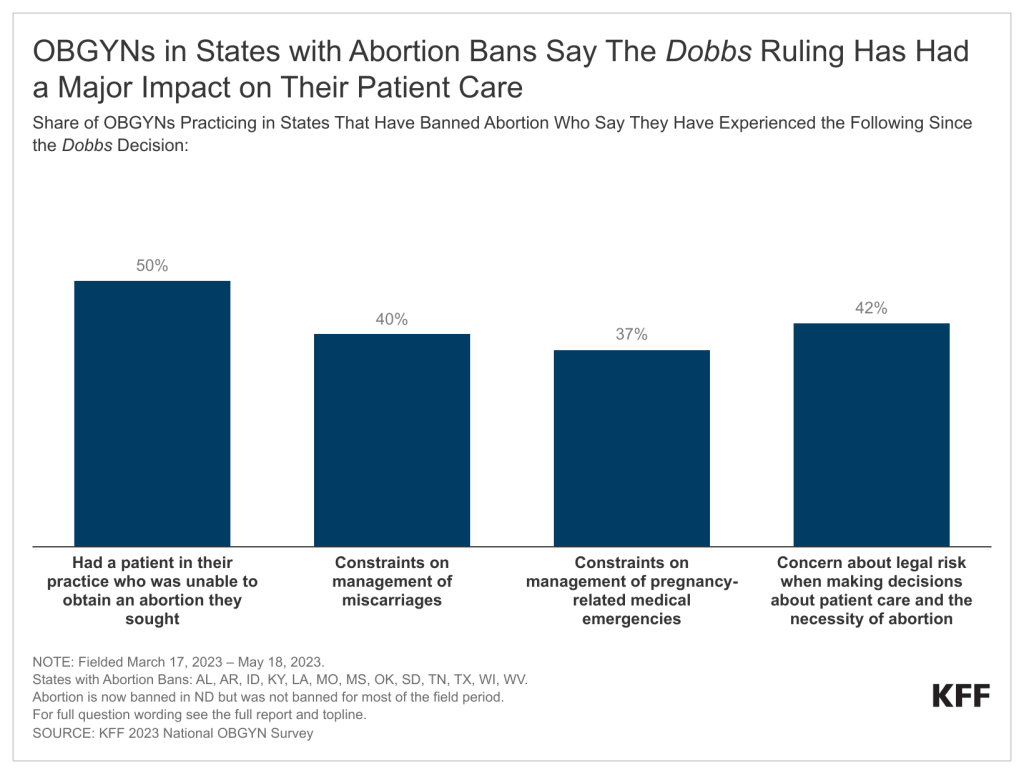
The independent source for health policy research, polling, and news.
New KFF National Survey of OBGYNs Finds Dobbs Decision Has Made It Harder to Treat Miscarriages and Other Pregnancy-Related Emergencies in Affected States; In States with Bans, Half Report Patients Who Were Unable to Obtain an Abortion They Sought
Majorities of OBGYNs are Concerned About Worsening Mortality, Racial and Ethnic Inequities, and Maternal Health
A new KFF survey of office-based OBGYNs finds widespread effects on their practices and patients since the Supreme Court’s decision in Dobbs v. Jackson Women’s Health Organization one year ago.
In states with abortion bans, half say that they have patients who have been unable to obtain an abortion, about four in ten say that they have faced constraints on their care for miscarriages and pregnancy-related emergencies, and six in ten (61%) express concerns about legal risk when making decisions about patient care. Nearly as many OBGYNs practicing in states with gestational limits on abortion also say they faced such challenges in their practices.

Among all OBGYNs nationally, one in four (24%) say they have had patients who could not obtain an abortion they sought. More than four in 10 (42%) OBGYNs nationally report being very or somewhat concerned about their own legal risk when making decisions about patient care and the need for an abortion.
Furthermore, large shares of OBGYNs believe that the Dobbs decision has also exacerbated pregnancy-related mortality (64%), racial and ethnic inequities in maternal health (70%), and made it harder to attract new OBGYNs to the field (55%).
The survey finds that 60% of OBGYNs in states where abortion is banned report their decision-making autonomy has worsened, and 55% say it is more difficult to practice within the standards of care, which are the norms of medical treatment.
Additional findings include:
- More than half (55%) of all OBGYNs say they have seen an increase in the share of patients seeking some form of contraception since the Dobbs ruling, particularly sterilization (43%) and IUDs and implants (47%).
- Nationally, 18% of office-based OBGYNs say they provide abortion services after the Dobbs decision, statistically unchanged from before Dobbs.
- Three-in-10 (30%) OBGYNs practicing in states where abortion is banned say they do not provide, refer, or offer any resources for abortion services to their patients. Nearly half (48%) say they only offer information, such as online resources, to help patients seek out abortion services on their own.
The KFF 2023 National OBGYN Survey obtained responses from a nationally representative sample of OBGYNs practicing in the United States who provide sexual and reproductive health care to patients in office-based settings. From March 17 to May 18, 2023, survey responses were collected from 569 OBGYNs.
Read “A National Survey of OBGYNs’ Experiences After Dobbs” for details about the provision of sexual and reproductive health care provided by OBGYNs before and after the Dobbs decision.